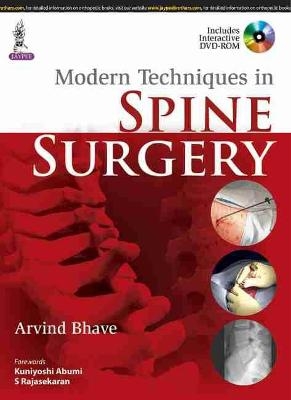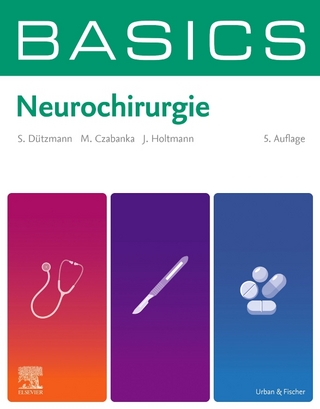
Modern Techniques in Spine Surgery
Jaypee Brothers Medical Publishers (Verlag)
978-93-5152-530-1 (ISBN)
Minimally invasive techniques are now the preferred method for spine surgery because the incision is much smaller, causing less damage to surrounding muscles, pain is usually greatly reduced, and recovery time is faster.
This book is a practical guide to minimally invasive diagnostic and surgical techniques for spine operations. Beginning with an overview of spinal anatomy and the basics of minimally invasive surgery, the following chapters examine the management of numerous different spinal conditions. A complete chapter is dedicated to patients with spinal cord injury and rehabilitation.
More than 200 clinical photographs, diagrams and tables enhance the comprehensive text, making it an invaluable resource for both trainees and practising spine surgeons.
Key points
Comprehensive guide to minimally invasive spine surgery
Covers diagnosis and treatment of numerous spinal disorders
Complete chapter dedicated to spinal injury and rehabilitation
Includes more than 200 photographs and illustrations
Arvind Bhave Fellow, Spinal Injuries Centre (Japan); Fellow, Minimally Invasive Spine Surgery (Korea); Professor in Orthopaedics, Bharati Vidyapeeth Medical College, Pune; Spine Surgeon & Endoscopy & Minimally Invasive Spine Surgery, Deenanth Mangeshkar Hospital, Pune, Maharashtra, India
Fundamental Anatomic Aspects of the Lumbar Foraminal Zone Applied to the Transforaminal Procedures
Philosophy of Minimally Invasive Spine Surgery
Sacroiliac Joint (Sij) Pain Syndrome: Anatomy Diagnosis and Treatment Surgical Laser Thermoneurectomy
Treatment for Sacro-Iliac Joint Pain - A Minimally Invasive Algorithmic Approach
Role of Disc- Fx® for Annulo-nucleoplasty in the Management of Lumbar Disc Pathology
Pearls and Tricks of Endoscopic Minimally Invasive Spinal Surgery
Transforaminal Discectomy on Difficult L4L5 Hernias
Prevention of Development of Post-operative Dysesthesia in Transforaminal Percutaneous Endoscopic Lumbar Discectomy for Intracanalicular Lumbar Disc Herniations (Floating Retraction Technique)
Percutaneous Endoscopic Lumbar Discectomy for Migrated Herniations
Percutaneous Posterolateral Endoscopic Treatment for Spinal Infection
Microendoscopic Decompression Using Tubular Retractor System for Lumbar Canal Stenosis
How Much Cement is Enough for Vertebroplasty to Reduce Adjacent Vertebral Fractures in Osteoporotic Vertebral Fractures
Key Points in Minimally Invasive Spine Stabilization for Thoracic and Lumbar Lesions with Spine Navigation
Technique of Odontoid Screw Fixation for Type Ii Odontoid Fractures
Anterior Foraminotomy for Cervical Disc Disease
Anterior Cervical Corpectomy for Cervical Spondylotic Myelopathy
Acute Management of Patients with Spinal Cord Injury and Rehabilitation
Laminoplasty with Suture Anchor Fixation
Motion Preservation Surgery in the Cervical Spine
Idiopathic Scoliosis: Principles of Surgical Management
Posterior Correction Techniques in Adolescent Idiopathic Scoliosis
Minimally Invasive Treatment of Pediatric Spinal Deformity
Pedicle Subtraction Osteotomy: Surgical Technique
Management of Spinal Kyphotic Deformities
The Lumbar Facet Syndrome
Degenerative Lumbar Scoliosis - Controversial Issues and a New Challenge
Degenerative Lumbar Kyphosis: Pathogenesis and Global Standard for Management
Sagittal Spinal Alignment and its Clinical Implication
Instability of Lumbar Spine—Diagnosis, Assessment and Management
Lateral Access to the L5-S1 and Adjacent Discs by Retracting the Psoas Muscle
Lumbar Spinal Stenosis—Current View
Combined Lumbo-Sacral Fusion in One Stage Using Anterior then Posterior Approach: Surgical Technique and Results
Surgical Results of Dynamic Nonfusion Stabilization with the Segmental Spinal Correction System for Degenerative Lumbar Spinal Diseases with Instability: Minimum 2-year Follow-up
Pyogenic Spinal Infection—Current Views in Diagnosis and Management
Tuberculosis of Spine—Current Views in Diagnosis and Management and Global Standard
Sacropelvic Fixation
Surgery for Sacrum Tumors
Novel Interlaminar Dynamic Stabilization Concept and Device (Intra SPINE) for the Treatment of Early and Late Degenerative Problems in the Lumbar Spine
| Erscheint lt. Verlag | 30.11.2014 |
|---|---|
| Zusatzinfo | 5 Tables, unspecified; 212 Halftones, unspecified; 23 Illustrations, unspecified |
| Verlagsort | New Delhi |
| Sprache | englisch |
| Maße | 216 x 279 mm |
| Gewicht | 890 g |
| Themenwelt | Medizinische Fachgebiete ► Chirurgie ► Neurochirurgie |
| Medizinische Fachgebiete ► Chirurgie ► Unfallchirurgie / Orthopädie | |
| ISBN-10 | 93-5152-530-9 / 9351525309 |
| ISBN-13 | 978-93-5152-530-1 / 9789351525301 |
| Zustand | Neuware |
| Informationen gemäß Produktsicherheitsverordnung (GPSR) | |
| Haben Sie eine Frage zum Produkt? |
aus dem Bereich


